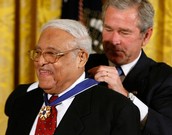 Bro. Benjamin L. Hooks (con't.)
Bro. Benjamin L. Hooks (con't.)
Hooks was so often in the public eye that it is not surprising that Tennessee Senator Howard Baker submitted his name to President Richard M. Nixon for political appointment. While he was campaigning, Nixon had promised African American voters that he would see that they were treated fairly by the broadcast media. Thus, in 1972 when there was a vacancy on the seven-member board of the Federal Communications Commission (FCC), Hooks was named to fill it. Although Hooks was not the choice of the most articulate African American groups, including the Black Congressional Caucus, the great majority acquiesced gracefully to his appointment. Benjamin and Frances Hooks soon moved to Washington, D.C. Fortunately for Hooks, his wife matched him in energy, stamina and ambition. She often served as his assistant, secretary, advisor, and traveling companion, even though it meant that her own distinguished career as a teacher and guidance counselor was sacrificed. She told Ebony magazine, "He said he needed me to help him. Few husbands tell their wives that they need them after thirty years of marriage, so I gave it up and here I am. Right by his side."
The new position at the FCC gave Hooks a real opportunity to effectuate change in the roles of minorities in the entire broadcast industry. The FCC was responsible for granting licenses to television, radio, and cable television stations and for regulating long distance telephone, telegraph, and satellite communications systems. Hooks felt that his primary role was to bring a minority point of view to the commission. He stated that although he had been nominated by the president, he represented the interests of African Americans, the largest minority in the nation. Hooks was appalled to find that only three percent of those employed by the FCC were African American people, and they were generally in low-paying positions. He encouraged the commission to hire more African American workers at all levels. By the time that he left FCC, African Americans constituted about 11 percent of the employee population. Hooks made a concerted effort during his years as a commissioner to see that African Americans were fairly treated in news coverage and to urge public television stations to be more responsive to the needs of African American viewers by including historical and cultural programming directed toward them.
National Association for the Advancement of Colored People
After serving on the FCC for five years, Hooks was asked to be the executive director of the NAACP, the organization which had formed the vanguard of civil rights advocacy from the beginning of the 20th century. Roy Wilkins, who had held the director's position since 1955, was retiring, and the NAACP board of directors wanted an able leader to take his place. They unanimously agreed that Hooks was the man. He resigned from the commission and officially began his directorship on August 1, 1977.
When Hooks took over the organization, the NAACP was in financial straits and membership had dwindled from half a million to just over 200, 000. Still the NAACP had local and regional offices throughout the country. He immediately directed his attention toward rebuilding the economic base of the association through a concentrated membership drive. He also advocated increased employment opportunities for minorities and the complete removal of United States businesses from South Africa. He told Ebony magazine "Black Americans are not defeated. … The civil rights movement is not dead. If anyone thinks we are going to stop agitating, they had better think again. If anyone thinks that we are going to stop litigating, they had better close the courts. If anyone thinks we are not going to demonstrate and protest … they had better roll up the sidewalks."
Hooks' tenure at the NAACP was fraught with bitter internal controversy. He was suspended by the chair of the NAACP's board, Margaret Bush Wilson, after she accused him of mismanagement. These charges were never proven. In fact he was backed by a majority of 64 member board and continued his tenure until his retirement in 1992.
Throughout his career, Hooks has been a staunch advocate for self-help among the African American community. He urges wealthy and middle class African Americans to give time and resources to those who are less fortunate. "Its time today … to bring it out of the closet. No longer can we provide polite, explicable reasons why Black America cannot do more for itself" he told the 1990 NAACP convention as quoted by the Chicago Tribune. "I am calling for a moratorium on excuses. I challenge black America today - all of us - to set aside our alibis."
After his retirement, Hooks served as Pastor of Middle Baptist Church and president of the National Civil Rights Museum, both in Memphis. He also taught at Fisk University.
Further Reading
There is no full-length biography of Hooks. However, articles and biographical sketches are included in Ebony Success Library (1973); Ebony magazine (June 1975); Jet (December 1972); and Broadcasting (April 1972). See also Minnie Finch, The NAACP, Its Fight for Justice (1981) and Warren D. James, NAACP, Triumphs of a Pressure Group, 1909-1980 (1980).